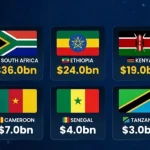President Donald Trump announced on Thursday that his administration will impose tariffs on semiconductor imports from companies that fail to shift production to the United States. The move, part of Trump’s broader tariff-driven trade policy, is intended to pressure global chipmakers into expanding U.S. manufacturing.
Speaking ahead of a dinner with major technology CEOs, Trump said: “Chips and semiconductors, we will be putting tariffs on companies that aren’t coming in. We will be putting a tariff very shortly… fairly substantial tariff with the understanding that if they come into the country, building, planning to come in, there will not be a tariff.”
Tariffs as a Policy Tool
Since returning to office in January, Trump has leaned heavily on tariffs to renegotiate trade deals, extract concessions, and exert political pressure on trading partners. His latest comments confirm a long-standing plan to impose tariffs on semiconductors, potentially around 100%, though exemptions will apply to companies with active or planned U.S. production.
Trump emphasized that Apple CEO Tim Cook is “in pretty good shape,” noting Apple’s commitment to invest $600 billion in U.S. operations over the next four years.
Impact on Global Semiconductor Firms
The policy is aimed squarely at foreign chipmakers, many of which supply the U.S. market.
- TSMC (Taiwan) and Samsung Electronics / SK Hynix (South Korea) have already announced large-scale U.S. chip manufacturing investments.
- Companies that do not commit to U.S. production could face hefty import tariffs.
If implemented, the tariffs would mark a major escalation in U.S. trade policy, reshaping global semiconductor supply chains.
Legal Challenges to Trump’s Tariffs
Trump’s reliance on tariffs has faced legal pushback. A lower court recently invalidated most of the tariffs imposed under a 1977 emergency law, a key legal foundation for Trump’s trade agenda. In response, his administration has asked the U.S. Supreme Court to intervene and preserve his authority to impose sweeping tariffs.
The Bigger Picture: U.S. Semiconductor Independence
The announcement comes amid growing efforts to reduce U.S. reliance on overseas chip manufacturing. The semiconductor industry is a critical pillar of national security and economic competitiveness, and Trump has positioned tariffs as a way to accelerate domestic chip production.
Final Thoughts
Trump’s latest tariff threat underscores his commitment to using trade pressure as leverage. While firms like Apple, TSMC, and Samsung appear aligned with U.S. investment goals, companies that resist relocating or building in America could face steep costs. The outcome will shape not only the future of global chip supply chains but also the broader U.S.-China tech rivalry.












